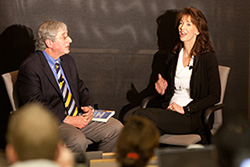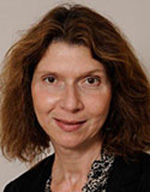

Whole Genome Sequencing
Whole Genome Sequencing: Educating Medical Students of Today about a Technology of Tomorrow
The 1997 movie "Gattaca" imagines a future where newborn genetic screening is used to determine one’s disease risk and life expectancy and, chillingly, one’s place in society. Sixteen years ago, this scenario seemed a distant possibility. But the ability to decipher a person’s genetic makeup — using a technology called whole genome sequencing (WGS) — is no longer the stuff of science fiction. And now that the cost of WGS ($3 billion per genome in 2003 and about $5,000 today) is approaching that of routine diagnostic scans, the medical, ethical, social, and legal issues raised by WGS have taken on a new urgency.

Robert Marion, M.D. interviews Debbie Jorde, a guest to the MCFM course in 2011 whose family was the first ever to have their entire genome sequenced"What if we know that an infant carries a mutation that will make her highly susceptible to developing breast cancer at age 30 or 40?," wrote Dr. Robert Marion, a pediatric geneticist, in a post for Einstein’s blog The Doctor’s Tablet."Should we tell her parents? Who should have access to the information? The family? The child’s physicians? The family’s insurance company? The child’s eventual employer?"
To prepare medical students for the brave new world of genomic medicine, lessons about WGS have been woven into the Einstein curriculum, beginning with the first- year course Molecular and Cellular Foundations of Medicine (MCFM). Two years ago MCFM featured a poignant presentation featuring Debbie Jorde, the mother of two children with a rare genetic disorder. Jorde’s family was the first ever to undergo WGS, which helped researchers identify genetic mutations responsible for her children’s abnormalities.

Howard Steinman, Ph.D., leads the Molecular and Cellular Foundations of Medicine (MCFM) course, where whole genome sequencing (WGS) is introduced to students"It’s important that our future physicians be well-versed in both genomic medicine and genetic medicine," noted Dr. Marion in a recent interview."Genetic medicine focuses on the diagnosis and management of single-gene hereditary disorders, while genomic medicine involves using information about an individual’s entire genetic makeup, or genome, to aid with diagnosis or clinical decision-making."
"In MCFM, we teach about the promise of the technology, but also about the uncertainty it will bring," added Dr. Howard Steinman, assistant dean for biomedical science education."The fact is, we don’t yet know how to interpret most of the information that can be gleaned from WGS or how to apply it to clinical practice."
According to Dr. Steinman, this is an important message to impart to would-be physicians."This may be a stereotype," he explained,"but students come into medical school thinking that they are going to cure disease. In MCFM, we talk about curing disease but also about managing disease. Physicians can’t always speak with certitude, and this will be true for WGS for years to come."
MCFM also teaches students about testing for single-gene mutations, such as BRCA1 and BRCA2 mutations, which significantly increase a women’s risk for breast cancer — examples of the type of genetic finding that will become commonplace in the era of genomic medicine.

Elizabeth Kitsis, M.D., director of bioethics education, introduces bioethical issues relevant to WGS in courses for medical and graduate studentsIssues related to WGS arise, naturally, in Bioethics 1 and 2, which span the first two years of the curriculum."In genetics, things are moving so fast that it’s almost impossible to anticipate what’s coming next," said Dr. Elizabeth Kitsis, director of bioethics education. “What we try to do in Bioethics is teach the students how to identify ethical issues, and then how to reason through them in a sensitive and analytical manner, applying any relevant guidelines or laws. So, even if they can’t anticipate a problem, they will have a process for dealing with it."
This year, students in Bioethics 1 were challenged to debate the pros and cons of having their own genomes sequenced."It was a fascinating exercise," said Dr. Kitsis. The session began with the students viewing a video clip of Dr. Francis Collins, Director of the National Institutes of Health, describing what it was like to have his own genome sequenced. "The debate raised many of the ethical concerns that are bound to arise in genetics as it applies to clinical practice, such as privacy, informed consent, confidentiality and discrimination."
Medical students also have the opportunity to learn more about WGS through the Classic Cases and Current Controversies elective, while graduate students get an introduction to the topic through Computational Genomics.
Since WGS is still in its infancy, there’s a limit to how much students can be taught about the practical applications of this technology, noted Dr. Marion."Our challenge is to prepare students for a lifetime of learning, so they’re ready for advances like WGS when the time comes."
Nonetheless, Dr. Marion expects to see much more WGS content in the curriculum in the months and years ahead."Because of WGS," he said,"medicine will move from a field in which we wait for people to develop signs and symptoms of disease, and then offer treatment, to a field in which we can recognize individuals who are predisposed to disease and then take steps to prevent it from ever happening. It will revolutionize the way that medicine is taught and the way it is practiced."
Posted on: Monday, May 13, 2013


